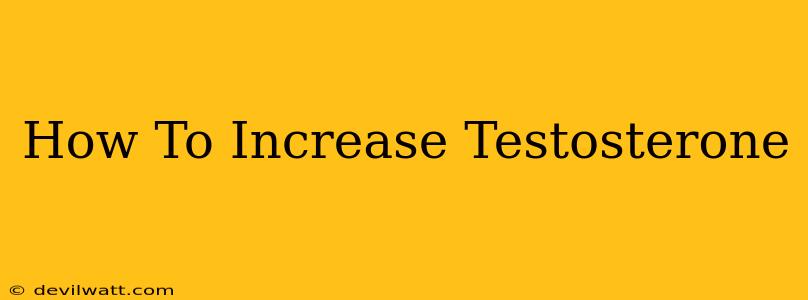Low testosterone can significantly impact your health and well-being, leading to decreased energy levels, reduced muscle mass, and even mood swings. While medical intervention may be necessary in some cases, many natural methods can help boost your testosterone levels. This comprehensive guide explores effective strategies to increase your testosterone naturally and safely.
Understanding Testosterone and its Importance
Testosterone is a crucial hormone, primarily responsible for the development and maintenance of male characteristics. However, it plays a vital role in both men and women's health, influencing muscle growth, bone density, libido, and overall energy. Low testosterone, or hypogonadism, affects millions, causing various symptoms that can severely impact quality of life. Before embarking on any testosterone-boosting strategy, it's crucial to consult your doctor to rule out any underlying medical conditions.
Lifestyle Changes to Boost Testosterone
Several lifestyle modifications can significantly impact your testosterone levels. These are often the first steps recommended before considering supplements or other interventions.
1. Optimize Your Diet
Nutrition plays a critical role in hormone production. Focus on a balanced diet rich in:
- Protein: Essential for muscle building and testosterone synthesis. Include lean meats, fish, poultry, eggs, and legumes.
- Healthy Fats: Monounsaturated and polyunsaturated fats are crucial. Sources include avocados, nuts, seeds, and olive oil.
- Complex Carbohydrates: Provide sustained energy without the blood sugar spikes associated with refined carbs. Choose whole grains, fruits, and vegetables.
- Zinc and Magnesium: These minerals are vital for testosterone production. Good sources include oysters, nuts, seeds, and leafy greens.
- Vitamin D: Plays a significant role in testosterone regulation. Get sufficient sunlight exposure or consider supplementation.
Avoid: Processed foods, sugary drinks, and excessive alcohol consumption, as these negatively affect testosterone levels.
2. Prioritize Sleep
Sleep deprivation significantly reduces testosterone levels. Aim for 7-9 hours of quality sleep per night. Establish a consistent sleep schedule, create a relaxing bedtime routine, and ensure a dark, quiet, and cool sleeping environment.
3. Manage Stress
Chronic stress elevates cortisol levels, which can suppress testosterone. Implement stress-management techniques like regular exercise, yoga, meditation, or spending time in nature.
4. Engage in Regular Exercise
Weight training is particularly effective in boosting testosterone. Focus on compound exercises like squats, deadlifts, and bench presses. Cardiovascular exercise is also beneficial for overall health and can indirectly contribute to improved testosterone levels.
5. Limit Exposure to Endocrine Disruptors
Certain environmental chemicals, known as endocrine disruptors, can interfere with hormone production. Reduce your exposure by:
- Minimizing plastic use: Opt for glass or stainless steel containers.
- Choosing organic food: Reduce pesticide exposure.
- Avoiding exposure to pesticides and herbicides.
Natural Supplements to Consider
While lifestyle changes are paramount, some natural supplements may support testosterone production. Always consult your doctor before taking any supplements, especially if you have underlying health conditions or are taking other medications. Some commonly discussed options include:
- D-Aspartic Acid (D-AA): A naturally occurring amino acid that may stimulate testosterone production.
- Fenugreek: A herb with potential testosterone-boosting properties.
- Ashwagandha: An adaptogen that may help manage stress and improve testosterone levels.
- Magnesium: Essential for testosterone production.
When to Seek Medical Attention
If you suspect you have low testosterone and have made significant lifestyle changes without improvement, seek medical advice. Your doctor can conduct tests to determine your testosterone levels and recommend appropriate treatment options, which may include testosterone replacement therapy (TRT) in some cases.
Conclusion
Increasing testosterone naturally involves a holistic approach encompassing lifestyle modifications and, in some cases, targeted supplementation. By focusing on diet, sleep, stress management, exercise, and minimizing exposure to endocrine disruptors, you can significantly improve your chances of naturally boosting your testosterone levels and enhancing your overall well-being. Remember to consult your doctor before making any significant changes to your diet or lifestyle, especially if you have any pre-existing health conditions.

